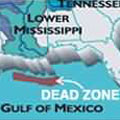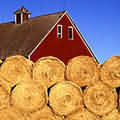|
作者:伊莉莎白•沙文
2002年10月7日
8月16日發行的《科學》雜誌的專題有一個令人毛骨悚然的標題:死亡區域正在成長。在標題的右邊是一張墨西哥灣的圖片,沿著海灣有一綠色的條狀物—— 這就是死亡區域。在這個區域裡面,氧氣的濃度很低,所以大部分的海洋生物(包括蝦蟹類)都沒有辦法生存。造成這個問題的主要原因是那些由密西西比河流域排放的農肥廢料。這些廢料刺激大量的藻類生長,當藻類死去時,它們沉落水底並且分解,而在這個過程中消耗了大部分的氧氣。今年,死亡區域變得比以往都大,將近有8500平方英哩,比紐澤西州還要大。

地圖提供:美國環保署
這死亡區域也許是一個引人注目的頭條,但這只是我們現代農業系統所帶來的許多影響之一。灌溉導致地下蓄水層損耗,除草劑積留於地下水,養豬廠廢水污染河川,還有基因改造作物(GM協會已通一翻為基因改造,因改良一詞,好像預設了改變基因一定是好的)對生態系的全面影響仍屬未知。把這些事情放在一塊兒,也許會誘使你想要指責農人,畢竟他們就是那些使用化學物質及種植基改作物的罪魁禍首。但在一次工作計畫裡,我試圖從玉米生產的領域來瞭解這些現象的根本原因,參與了4年之後,我可以告訴你,這些問題的產生並不是在於農人的貪婪或冷漠,而是經濟因素。
農人,像所有在自由市場的實業家一樣,以競爭取得生存。競爭的條件已經被清楚定義了:看誰能以最少的勞力、土地、器具、物資投入(像是種子、肥料等)生產最多的作物。最有效率的農人是能以最少的成本獲得最大的利潤,最可能於市場生存;而在所謂「沒效率」的農人與傳統農業耕作消失的當下,農耕作業變得越來越有效率。這樣的改變帶來了無數的新發明及農作物產量的增加。以玉米生產為例,在1940年代時每英畝的生產量是30浦耳,今日則每畝有約120浦耳的收成量。(註:8 加侖等於1浦耳)
有那樣效率的收成量是我們以市場為主的經濟體系下的允諾,從許多方面來說,這是一件好事情;最起碼就理論上而言,我們以更少的土地餵養更多的人。但我們要如何去看待死亡區域?那些存留於地下水的除草劑及溪流中的糞肥呢?難道沒有更好的解決方法,不單能滿足人們的需求,同時在農地的下游能有健康的漁場,且有豐沛的活水流經於下?為什麼我們最自負的解決之道── 自由市場體系,無法在更大的收成量之外,也生產像這樣的產品呢?

充斥許多問題的土地(照片提供:美國農業部)
【文章連載】
■王老先生有個想法
(上) (下)
全文與圖片詳見: http://www.gristmagazine.com/citizen/ci
tizen100702.asp
版權歸屬Grist Magazine,台灣環境資訊協會 (徐怡德 譯,李欣哲 審校)
|
|
by Elizabeth Sawin
07 Oct 2002
The Aug. 16 issue of Science magazine features an ominous headline: "Dead Zone Grows." To the right of the headline is a map of the Gulf of Mexico with an irregular green stripe hugging the shoreline. This is the Dead Zone, an area of the gulf where oxygen levels are so low that most marine organisms -- including crab and shrimp -- cannot survive. A primary cause of the problem is fertilizer runoff from farms in the Mississippi River watershed. The runoff stimulates algae blooms. When the algae die, they sink to the bottom and decompose, using up oxygen in the process. This year, the Dead Zone is bigger than ever before -- nearly 8,500 square miles, an area larger than New Jersey.

Map: U.S. EPA
The Dead Zone may be the headline grabber, but it is only one of many impacts of our contemporary agriculture system. Irrigation leads to aquifer depletion, herbicides accumulate in groundwater, manure from hog farms pollutes rivers, and the full impacts of genetically modified crops on ecosystems are not yet known. Put it all together and you might be tempted to point your finger at farmers. After all, they are the ones out there applying the chemicals and planting the genetically modified seeds. But after spending four years working on a project to understand the root causes of issues like these in corn production, I can tell you that the problem doesn't lie with farmer greed or indifference; it lies with economics.
Farmers -- like all entrepreneurs in free-market systems -- compete to stay in business. The terms of that competition are clearly defined. Who can produce the most grain for the least cost of labor, land, machinery, and inputs (such as seed and fertilizer)? The farmers who are the best at maximizing this equation -- the most "efficient" farmers -- are the most likely to stay in business. As the "least efficient" farmers and farming practices disappear, farming as a whole becomes more and more efficient. This has brought enormous innovation and gains in productivity. Yields of corn, for example, have risen from about 30 bushels per acre in 1940 to around 120 bushels per acre today.
Achieving that kind of efficiency is the promise of our market-based system, and in many ways, it's a good thing; theoretically, at least, more people could be fed with less land. But what about the Dead Zone, the herbicides in groundwater, the manure in streams? Wouldn't a really efficient solution to human needs include a healthy fishery downstream of our farms, and plenty of pure water beneath them? Why hasn't the free-market system -- our most vaunted tool for solving humanity's problems -- delivered these goods as well?

Land o'plenty of problems. (Photo: USDA.)
http://www.gristmagazine.com/citizen/ci
tizen100702.asp |
